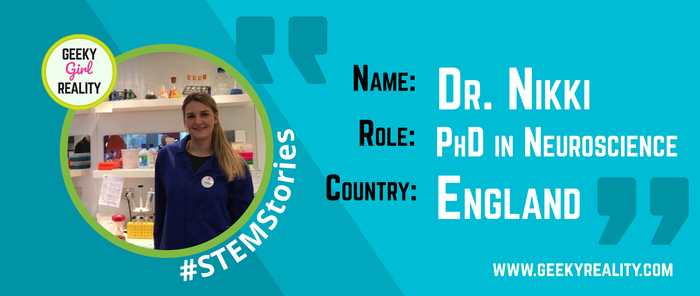 Last year, we spoke to Dr Nikki. She works for the NHS (the National Health Service in the UK), in a Clinical Genetics Laboratory.
Last year, we spoke to Dr Nikki. She works for the NHS (the National Health Service in the UK), in a Clinical Genetics Laboratory.
1. Introduce yourself, who are you, and what do you do?
Hi, I’m Dr Nikki Buckner. I recently completed my PhD in Neuroscience at the University of Bristol, UK. During my PhD, I used molecular biology to study what happens inside brain cells that die in neurodegenerative illnesses such as Parkinson’s disease.
I now work for the NHS (the National Health Service in the UK), in a Clinical Genetics Laboratory. I am a Genetic Technologist, which means I carry out different genetic tests for patients, which then allows doctors to provide the best diagnosis and treatment for people who have inherited or acquired genetic disease.
2. How did you arrive at this career (or point in your life/work)? Was it always something you knew you wanted to do?
I have always been interested in biology and animals. After the first year of my undergraduate degree, I become fascinated with the science of how cells work, and I focused on molecular cell biology. I became interested in healthcare science, and completed a Masters degree in Biomedical Science, before completing my PhD in Molecular Neuroscience.
Although my academic background has well-equipped me for my current job in healthcare genetics, my career journey so far has included working in lots of different places. I have worked in a pub, a call centre, a hospital carrying out eye tests for patients, as a research technician, worked for a hot air balloon company and a funeral home! Every job I have done has given me valuable experiences.
3. What about your job makes you jump out of bed in the morning, especially on those cold, dark mornings?
During my PhD, I was motivated by the adventure of studying something which no one else in the world had ever done before! I enjoyed the ownership and responsibility involved in driving forward a research project.
Although I have only recently begun my job in clinical genetics, I love the fact that I can use my scientific training for the direct benefit of patients. Each day I help to carry out important genetic tests which will diagnose patients and help to inform doctors how to provide people with the best possible treatment and management for their medical conditions.

4. What is your personal cure for stress or how do you raise your spirits in times of doubt? Can you share a story?
I have experienced anxiety throughout my education and career. This became particularly difficult during exams and at certain times during my PhD. I have learned to recognise the signs of stress and anxiety in myself, and to seek help in the form of support from family and friends, sick leave from work when necessary, and counselling. I’ve also learned that it is OK to take a mental health day for self-care when needed. For me, it has been really important to speak to somebody when I am feeling stressed, unhappy or unwell. Getting help and support early is key.
5. Who is your role model? If no one, any thoughts on this?
I have lots of role models. My parents are definitely one of my main role models. I have also been lucky to work with some great people in my career so far who have inspired me both personally and professionally. I also look up to those who stand up for what they believe in, and who are committed to improving the world.
6. What advice would you give to yourself if you could go back in time?
That things don’t always work out the way you expect, but that this is OK! Every opportunity is a learning experience. I would also remind myself that comparing myself directly against others is unhelpful – everyone is different and we all have individual and unique strengths. I would also remind myself to prioritise my health and happiness. Life is short and it’s important to be happy and enjoy yourself!
7. Top 3 tips for girls starting out in STEM?
Don’t be discouraged if you are not always successful the first time around – don’t give up on your ambitions and be persistent!
Keep an open mind. It can be difficult to know exactly what opportunities will come to you in future, so be receptive to different opportunities.
Don’t be afraid to speak your mind, and always stand up for what you think is right. Demand recognition for your work and don’t allow anyone else to silence you.
8. How do you measure your success?
There is certainly value in recognising academic and career success, and I felt very successful after completing my PhD! It’s always nice to feel that you have done well academically or in work. However, I try not to focus on comparing myself too much against external measures. For me, it is also important to appreciate my own intrinsic value. I feel successful when I am happy in myself, when I am able to appreciate each day, and when I am doing my best to be kind to others.

9. Where can we find out more about your work?
I have a profile on the University of Bristol website (https://research-information.bris.ac.uk/en/persons/nikki-r-buckner), and I am on ResearchGate (https://www.researchgate.net/profile/Nikki_Buckner). You can also search for my published work using my ORCID ID 0000-0003-2842-9928.
10. Are you social? Will you share your Twitter handle, or LinkedIn profile, or Facebook so that young women can connect with you?
Yes! I am on Twitter @NikkiRBuckner, and you can also find me on LinkedIn.I’m happy to hear from you.

